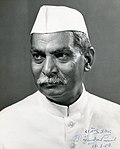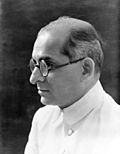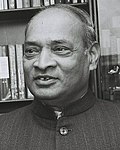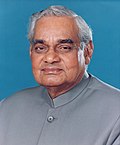| Portrait | Minister
(Birth-Death)
Constituency | Term of office | Political party | Ministry | Prime Minister |
|---|
| From | To | Period |
|---|
| Minister of State for Food and Agriculture |
|---|
|  | Panjabrao Deshmukh
(1898–1965)
MP for Amravati
Minister of Cooperation from 25 Apr 1957 | 17 April 1957 | 10 April 1962 | 4 years, 358 days | Indian National Congress | Nehru III | | Jawaharlal Nehru |
|  | Ram Subhag Singh
(1917–1980)
MP for Bikramganj | 8 May 1962 | 27 May 1964 | 2 years, 19 days | Nehru IV |
|  | Alungal Mathai Thomas
(1912–1981)
MP for Ernakulam | 21 November 1963 | 27 May 1964 | 10 years, 188 days |
|  | Ram Subhag Singh
(1917–1980)
MP for Bikramganj | 27 May 1964 | 9 June 1964 | 13 days | Nanda I | | Gulzarilal Nanda |
|  | Alungal Mathai Thomas
(1912–1981)
MP for Ernakulam | 17 days |
| 9 June 1964 | 13 June 1964 | Shastri | | Lal Bahadur Shastri |
| Minister of State for Food, Agriculture, Community Development and Cooperation |
|---|
|  | Panampilly Govinda Menon
(1906–1970)
MP for Mukundapuram | 24 January 1966 | 13 March 1967 | 1 year, 48 days | Indian National Congress | Indira I | | Indira Gandhi |
|  | Annasaheb Shinde
(1922–1993)
MP for Kopargaon | 13 March 1967 | 18 March 1971 | 4 years, 5 days | Indira II |
|  | M. S. Gurupadaswamy
(1924–2011)
Rajya Sabha MP for Uttar Pradesh | 5 June 1967 | 17 October 1969 | 2 years, 134 days |
|  | Annasaheb Shinde
(1922–1993)
MP for Kopargaon | 18 March 1971 | 2 May 1971 | 45 days | Indira III | |
| Minister of State for Industry and Civil Supplies |
|---|
|  | Anant Sharma
(1919–1988)
Rajya Sabha MP for Bihar | 10 October 1974 | 9 August 1976 | 1 year, 304 days | Indian National Congress (R) | Indira III | | Indira Gandhi |
|  | Buddha Priya Maurya
(1926–2004)
MP for Hapur |
|  | A. C. George
MP for Mukundapuram |
| Minister of State for Civil Supplies and Cooperation |
|---|
|  | A. C. George
MP for Mukundapuram | 9 August 1976 | 24 March 1977 | 227 days | Indian National Congress (R) | Indira III | | Indira Gandhi |
|  | Arif Beg
(1935–2016)
MP for Bhopal | 14 August 1977 | 28 July 1979 | 1 year, 348 days | Janata Party | Desai | | Morarji Desai |
|  | Krishna Kumar Goyal
(1932–2013)
MP for Kota |
| Minister of State for Commerce and Civil Supplies |
|---|
|  | Henry Austin
(1920–2008)
MP for Ernakulam | 30 July 1979 | 14 January 1980 | 349 days | Indian National Congress (U) | Charan | | Charan Singh |
| Minister of State for Food and Civil Supplies |
|---|
|  | Ajit Kumar Panja
(1936–2008)
MP for Calcutta North East | 19 February 1986 | 22 October 1986 | 245 days | Indian National Congress | Rajiv II | | Rajiv Gandhi |
|  | Ghulam Nabi Azad
(born 1949)
MP for Washim | 22 October 1986 | 7 September 1987 | 320 days |
|  | Ram Pujan Patel
(1940–2021)
MP for Phulpur | 23 April 1990 | 10 November 1990 | 201 days | Janata Dal | Vishwanath | | Vishwanath Pratap Singh |
|  | Sarwar Hussain
(born 1949)
MP for Bulandshahr | 21 November 1990 | 20 February 1991 | 91 days | Samajwadi Janata Party (Rashtriya) | Chandra Shekhar | | Chandra Shekhar |
| Minister of State for Civil Supplies, Consumer Affairs and Public Distribution |
|---|
| | Kamaluddin Ahmed
(1930–2018)
MP for Hanamkonda | 21 June 1991 | 29 September 1994 | 3 years, 100 days | Indian National Congress | Rao | | P. V. Narasimha Rao |
|  | Krishna Sahi
(born 1931)
MP for Begusarai
Minister of State, Civil Supplies from 19 Sep 1995 | 15 September 1995 | 16 May 1996 | 244 days |
|  | Venod Sharma
(born 1948)
MP for Haryana (Rajya Sabha)
Minister of State, Consumer Affairs and Public Distribution System from 19 Sep 1995 |
| Minister of State for Food and Consumer Affairs |
|---|
|  | Satyapal Singh Yadav
(born 1942)
MP for Shahjahanpur | 19 March 1998 | 13 October 1999 | 1 year, 208 days | Bharatiya Janata Party | Vajpayee II | | Atal Bihari Vajpayee |
| Minister of State for Consumer Affairs and Public Distribution |
|---|
| | V. Sreenivasa Prasad
(1947–2024)
MP for Chamarajanagar | 13 October 1999 | 17 July 2000 | 278 days | Samata Party | Vajpayee III | | Atal Bihari Vajpayee |
|  | Sriram Chauhan
(born 1953)
MP for Basti | 22 November 1999 | 17 July 2000 | 238 days | Bharatiya Janata Party |
| Minister of State for Consumer Affairs, Food and Public Distribution |
|---|
| | V. Sreenivasa Prasad
(1947–2024)
MP for Chamarajanagar | 17 July 2000 | 6 March 2004 | 3 years, 233 days | Janata Dal (United) | Vajpayee III | | Atal Bihari Vajpayee |
|  | Sriram Chauhan
(born 1953)
MP for Basti | 17 July 2000 | 1 September 2001 | 1 year, 46 days | Bharatiya Janata Party |
|  | Ashok Kumar Pradhan
(born 1953)
MP for Khurja | 1 September 2001 | 1 July 2002 | 303 days |
|  | U. V. Krishnam Raju
(1940–2022)
MP for Narasapuram | 1 July 2002 | 29 January 2003 | 212 days |
|  | Subhash Maharia
(born 1957)
MP for Sikar | 29 January 2003 | 22 May 2004 | 1 year, 114 days |
|  | Kantilal Bhuria
(born 1950)
MP for Ratlam | 23 May 2004 | 22 May 2009 | 4 years, 364 days | Indian National Congress | Manmohan I | | Manmohan Singh |
|  | Akhilesh Prasad Singh
(born 1962)
MP for Motihari | 23 May 2004 | 22 May 2009 | 4 years, 364 days | Rashtriya Janata Dal |
|  | Mohammed Taslimuddin
(1943–2017)
MP for Kishanganj | 25 May 2004 | 22 May 2009 | 4 years, 362 days |
|  | K. V. Thomas
(born 1946)
MP for Ernakulam | 29 May 2009 | 19 January 2011 | 2 years, 51 days | Indian National Congress | Manmohan II |
|  | Raosaheb Danve
(born 1955)
MP for Jalna | 27 May 2014 | 6 March 2015 | 283 days | Bharatiya Janata Party | Modi I | | Narendra Modi |
|  | C. R. Chaudhary
(born 1948)
MP for Nagaur | 5 July 2016 | 30 May 2019 | 2 years, 329 days |
|  | Raosaheb Danve
(born 1955)
MP for Jalna | 31 May 2019 | 7 July 2021 | 2 years, 37 days | Modi II |
| 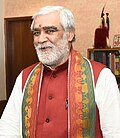 | Ashwini Kumar Choubey
(born 1953)
MP for Buxar | 7 July 2021 | 9 June 2024 | 2 years, 339 days |
|  | Niranjan Jyoti
(born 1967)
MP for Fatehpur |
|  | B. L. Verma
(born 1961)
MP for Uttar Pradesh (Rajya Sabha) | 10 June 2024 | Incumbent | 1 year, 175 days | Modi III |
|  | Nimuben Bambhaniya
(born 1966)
MP for Bhavnagar |
|


